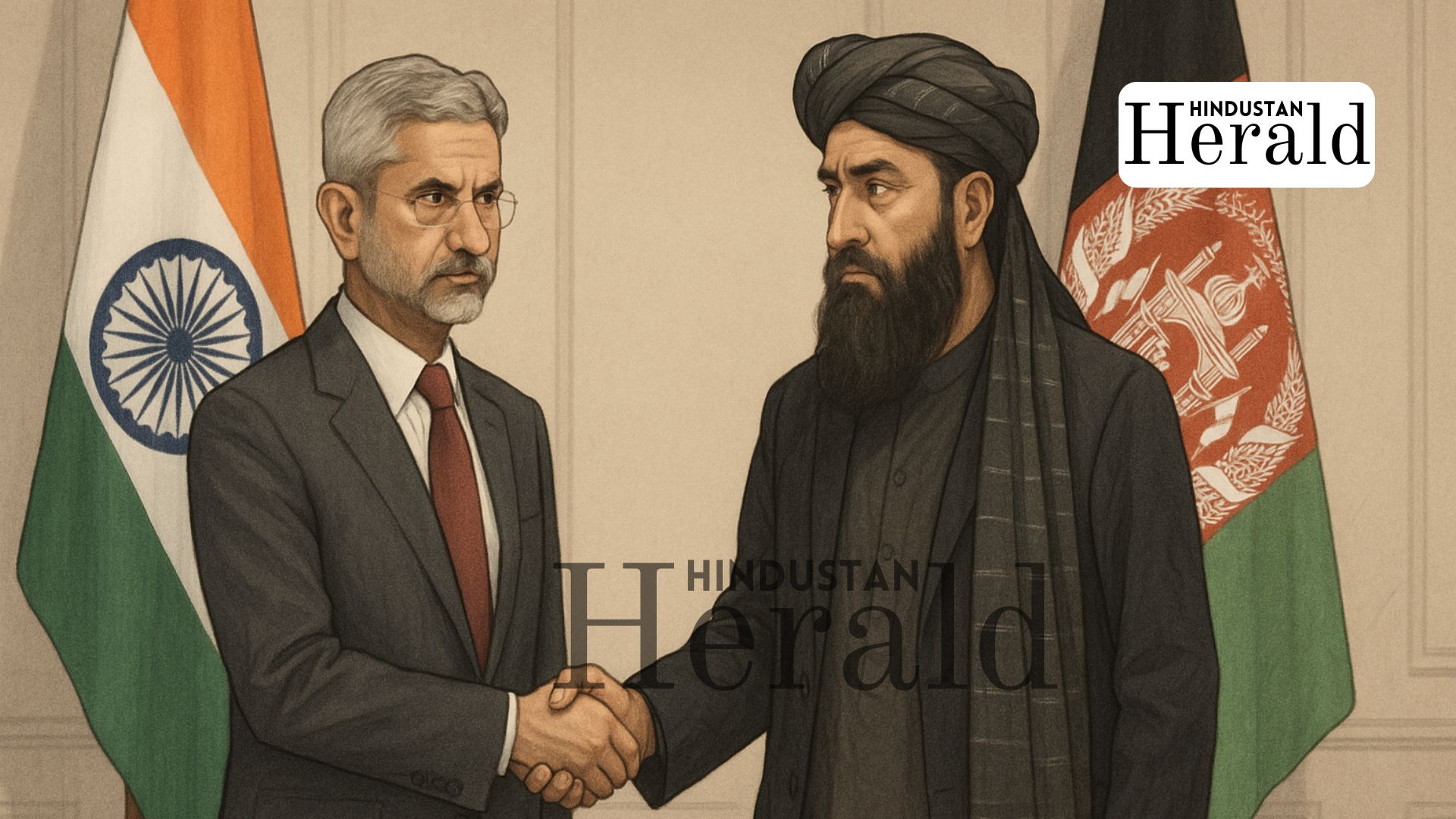New Delhi, October 14: Something strange is happening in India’s foreign policy, and everyone can feel it. A country that once swore never to shake hands with the Taliban is now quietly doing just that.
Last week, Amir Khan Muttaqi, the Taliban’s foreign minister, landed in Delhi. The man is still under UN sanctions, yet he was allowed to travel after a special waiver. He met S. Jaishankar, sat down for talks, and left with words about “friendship” and “mutual respect.” The visit wasn’t tucked away in backrooms either. The cameras rolled. Handshakes were exchanged.
And just like that, a red line India had held for decades started to blur.
A Visit That Says Too Much
The government referred to it as “pragmatic engagement.” Diplomats said it was about “protecting interests.” But for many, the optics told another story.
At one press event, women journalists were stopped at the door. No explanation, no apology. Inside, a huge photo of the Bamiyan Buddhas, the same statues the Taliban blew up in 2001, loomed behind Muttaqi as he spoke. It was either tone-deaf or deliberate, depending on who you ask.
No one from the Indian side objected. No note of protest, no awkward silence. Instead, the government’s online army jumped to defend the Taliban’s “rules.” That defence hit a raw nerve.
“This is the lowest we’ve fallen,” one senior reporter told me later. “To see women barred and everyone just carry on it felt like a betrayal.”
Writers like Javed Akhtar called it “shameful.” Mehbooba Mufti accused the BJP of “hugging the real jihadists” while policing imaginary ones at home. The outrage had less to do with policy, more to do with what it said about the country’s moral compass.
So Why Now?
Behind the scenes, the logic is old-fashioned geopolitics.
The Taliban’s friendship with Pakistan has been cracking. Over the past month, deadly clashes have erupted along their shared border. Islamabad accuses the Taliban of harbouring the Tehrik-e-Taliban Pakistan, a militant group that has turned its guns on Pakistan itself. Kabul denies it, but the tension is real.
For New Delhi, this is a rare opening. If the Taliban are angry with Pakistan, the thinking goes, India can use that to wedge its way back into Afghanistan, a country where it once built roads, hospitals, power plants, and even the Parliament building.
Then there’s China. Beijing has already swooped in with mining deals and diplomatic overtures. India fears that if it stays away, Afghanistan will become another Chinese satellite.
And let’s not forget money. Between 2001 and 2021, India poured around $3 billion into Afghan reconstruction. When the Taliban returned, most of those projects froze. Re-engagement, officials admit privately, is also about protecting those assets.
So yes, the motives are clear. Strategic depth. Access to minerals. A counter to Pakistan. But clarity doesn’t always equal comfort.
The Uneasy Part
The problem isn’t talking to the Taliban. The problem is how it’s being done.
No one minds diplomacy. Every government needs backchannels, even with enemies. But when a regime that bans girls from schools and jails musicians gets a public welcome in Delhi, complete with police escorts and polite smiles it’s hard not to feel something is off.
This is the same Taliban that once sheltered the men who hijacked IC-814. The same one that destroyed priceless heritage, persecuted women, and executed dissenters. And yet, last week, its representatives were treated like honoured guests.
For India, a country that built its international image on moral authority, that’s not a small shift. We have always claimed to be different a democracy that speaks of values even in hard times. The Taliban test that claim in ways no trade deal or summit ever could.
The Real Cost
Government insiders call the move “calculated realism.” Maybe it is. But realism without restraint quickly becomes surrender.
Every handshake chips away at credibility. Every silence on women’s rights, on minorities, on education bans costs India the moral ground it once stood on proudly. The world notices.
It’s also risky. Once India legitimises the Taliban in the eyes of the world, its ability to pressure them on terrorism or governance will shrink. The Taliban gets recognition; India gets a promise that can be broken any day.
And make no mistake, these are not men who change easily. The Taliban’s supreme leader, Haibatullah Akhundzada, is still wanted by the International Criminal Court for crimes against humanity. His regime has banned girls from classrooms, artists from performing, and women from public life. That’s the government we’re now calling a “partner.”
What Happens Next
If India is determined to keep this line open and all signs say it is, then it needs to draw firm boundaries.
No recognition unless terror links are severed. No investment without guarantees on women’s rights. No photo-ops without substance. And above all, the right to walk away if promises are broken.
There’s a way to be practical without becoming complicit. That’s the balance New Delhi must hold.
The Bigger Picture
Let’s be honest: this is also a sign of loneliness. India’s traditional allies, the U.S., Europe, and even parts of the Arab world are preoccupied. Pakistan still has China in its corner. Trump’s re-emergence on the scene complicates things further. In that vacuum, the Taliban suddenly looks like a convenient pawn.
But pawns have a way of turning the board upside down.
History has seen this before: governments thinking they can tame the Taliban for strategic gain. It never ends well.
India has every reason to protect its interests in Afghanistan. The question is whether it can do so without abandoning what once made it different, the belief that some lines are not meant to be crossed.
Because if we start treating fundamentalists as friends just because they irritate our enemies, then soon enough, we’ll forget which side we were ever on.
Stay ahead with Hindustan Herald — bringing you trusted news, sharp analysis, and stories that matter across Politics, Business, Technology, Sports, Entertainment, Lifestyle, and more.
Connect with us on Facebook, Instagram, X (Twitter), LinkedIn, YouTube, and join our Telegram community @hindustanherald for real-time updates.
Covers Indian politics, governance, and policy developments with over a decade of experience in political reporting.






